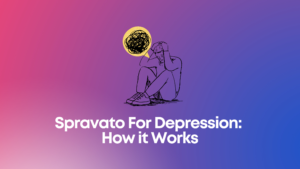“Approximately 33% of MDD patients do not respond to conventional antidepressant therapy and are classified as Treatment Resistant Depressed (TRD). These 7 million patients with TRD have more severe disease, more hospitalizations, and twice the healthcare costs of treatment responsive depressed patients.” (INMune Bio)
This would seemingly indicate a lack of effective treatments for those suffering from treatment-resistant depression. However, emerging research suggests that there are alternative treatment options that can help people overcome TRD. One option is something called transcranial magnetic stimulation (TMS).
What is TMS?
Transcranial magnetic stimulation, or TMS, is a non-invasive method of stimulating specific areas within the brain using magnetic fields. It was originally developed to help map brain activity by changing neural behavior (i.e., affecting the way the brain works). More recently, it has been tested as a means of treating several psychiatric conditions including depression, anxiety, obsessive-compulsive disorder, eating disorders, addiction/substance abuse, and post-traumatic stress disorder.
TMS devices consist of a large, round coil of wire that is held against the scalp. A magnetic pulse is transmitted through this coil of wire which then penetrates the scalp and skull to reach areas within the brain’s cortex (i.e., “thinking cap”). The current released by this pulse interacts with neurons in select regions of the brain, causing them to fire. This stimulates action within the brain that helps alleviate depressive symptoms.
In the U.S., TMS is a Food and Drug Administration-approved treatment for adults with Treatment Resistant Depression, especially those patients who haven’t responded to one or more antidepressants.
How effective is TMS?
There have been some promising results that have shown TMS to produce clinically significant improvement in up to 50-60% of individuals who have attempted and failed to obtain benefit from antidepressants. About one-third of these individuals experience a full remission, meaning their symptoms go away completely.
It is important to note that these results are not permanent, as most other treatments for mood disorders have a high recurrence rate. However, the majority of TMS patients report feeling much better for many months after treatment has ended, with the average duration of the response being about a year. Many patients will return for additional sessions of treatment.
What are the benefits of TMS?
Relatively few side effects are associated with TMS. Patients typically feel a tapping sensation on their scalp every few seconds as the magnetic pulse is being administered, but this generally subsides after about 20 minutes of treatment, and it completely disappears by the session’s end. The only other significant side effect is pain or discomfort at or near the targeted area, which typically goes away by the session’s end. TMS has been studied extensively, but little is known about the long-term effects. However, studies have shown that it is safe for frequent usage.
TMS can also be delivered in an outpatient setting – allowing individuals to live their normal lives during treatment – without anesthesia or sedation. It does not require any surgery, as opposed to electroconvulsive therapy (ECT), which is a more drastic option that can require anesthesia and can have many side effects.
How can PsyFi TMS clinic help you?
PsyFi TMS is a specialized TMS clinic focusing on the treatment of MDD, OCD, PTSD, and Smoking Cessation. We are invested in this technology because we know that it is not only effective but it is the future of psychiatry.
Our TMS treatment team consists of a leading psychiatrist and trained technicians, who have collectively administered thousands of treatments. We treat hundreds of patients each year using the latest in technology to ensure the best possible results for our patients.
For more information on TMS or any other psychiatric issues, please visit us at www.psyfitms.com or email us directly at info@psyfitms.com. We’re happy to answer questions about this treatment option and help guide you through the process of determining if it is the right choice for you.



